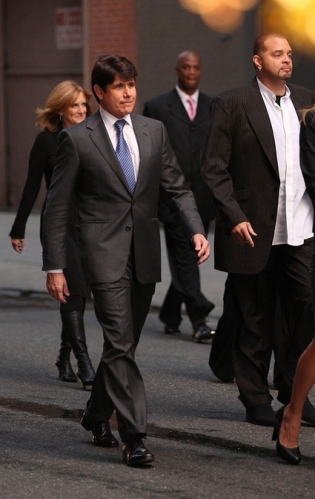
Chatty ex-Ill. Gov. Rod Blagojevich may have gotten an added stretch of freedom when a federal judge in Chicago decided this week to delay his Oct. 6 sentencing date. But legal observers are convinced the reprieve is only temporary and that he’ll get some serious prison time. Predictions range from 8 to 25 years.
“I’m just giving voice to whats generally been a consensus in the community,” said Rodger Heaton, a former U.S. Attorney for Central Illinois and currently with the law firm Hinshaw & Culbertson, “but I’ve been hearing a projected estimate of eight to fifteen years. Some people have also said ten or 11.”
Dick Simpson, a professor of political science at the University of Illinois-Chicago and frequent commentator on local news, echoes those sentiments.
“My guess is ten to 15 years,” Simpson said in an phone interview. “You have to look at other similar cases, and in particular I’m looking at former Governor George Ryan.” Ryan, the Illinois governor immediately preceding Blagojevich, is serving a six-and-a-half-year sentence after being convicted on federal corruption charges in 2006, though sentencing guidelines counseled for more.
“You have to look at both, and you figure how much worse one was than the other,” said Simpson.
Blagojevich engaged with the national media in a way few criminal defendants have. He went on a lengthy tour of popular television news and talk shows like the Late Show with David Letterman and the Daily Show and pleaded his innocence.

“In a sense, I have seen public officials who go on trial try to influence public perception,” said ex-U.S. Attorney Heaton, but Blagojevich’s errant behavior was something different. “I have not seen someone go on television talk shows, on reality shows,” the way Blagojevich has. “It is very unique to engage the popular media the way he has done.”
Though there is nothing in the federal sentencing guidelines that talks specifically about that sort of media engagement, says Heaton, it may significantly influence the sentencing judge’s perceptions of Blagojevich’s sense of remorse.
“Throughout, on his television appearances, he showed a failure to accept responsibility for his actions. He maintained his innocence and seemed to be willing to do anything to continue maintaining that,” said Heaton. “I think that will be one factor.”
In his first trial, Blagojevich was convicted on only 1 of 24 counts. The jury deadlocked on the remaining ones. But in the second trial, the prosecution trounced him, getting convictions on 17 of 20 counts. Technically, he faces up to around 250 years, but the sentencing guidelines call for far less. He has been free on $450,000 bond, having put up his North side Chicago home and a D.C. condo as collateral.
Some report that prosecutors will seek a 30 year sentence.
“[James Zagel, the sentencing judge] will be reasonably unhappy about the crime itself–he’s a former U.S. Attorney, a former state employee,” said Simpson, and he will not take kindly to a violation of the public trust. Still, most experts don’t predict the higher end of the sentencing. “You have violent crimes that get less than 30 years,” said Simpson.
A Dissenting Opinion
Unlike many defendants, Rod Blagojevich testified at his own trial the second time around. And because the jury, in convicting him, rejected his testimony, he in effect lied under oath. He was convicted of violating the public trust, a sad theme that has played out in Illinois’ politics for decades.
All of these factors were cited by Jami Floyd in predicting a sentence of 20 to 25 years. Floyd is a long-time legal correspondent for national news outlets. She got her law degree from the Boalt Hall School of Law at the University of California, Berkeley, and served as a law clerk at the California Supreme Court and had her own civil and criminal law practice.
“For me, the Madoff case is most instructive,” said Floyd. She had predicted back then that Madoff would get a long sentence, even life, while many others were predicting much lower sentences. Madoff, now 73, didn’t put up much of a legal fight and pleaded guilty in 2009. He ended up getting a whopping 150 years in prison, which will undoubtedly keep him behind bars for the rest of his life.
Denny Chin, the federal judge in that case, received a request from Madoff’s defense asking for a 25-year sentence, something that could potentially have given Madoff some hope of experiencing freedom once more before passing. Chin thought about the proposal and, according to an account in the New York Times, even asked his interns for an opinion. They suggested a 75-year sentence, less than the maximum but still effectively a life sentence.
“Splitting the baby, to me, was sending the wrong message,” he later told the New York Times, explaining his harsh, uncompromising sentence. “Often that’s the easy way out, but as we know from the old parable, that wasn’t the right thing to do.” While none of Madoff’s charges called for a life sentence, Chin ended up stacking the maximum sentence for each count.
“And he’s right,” Floyd said of Chin. “We give judges discretion for a reason. In Blagojevich I predict a similar result … Judge Zagel will depart upward from the sentencing guidelines in this case to give Blagojevich 20-25 years,” she said.
Such a sentence in the context of public corruption would be “dramatic” and “unprecedented,” Floyd acknowledged, but the leniency shown to Blagojevich’s predecessor, former Governor Ryan, is a “recommendation for a harsher sentence here,” said Floyd. “I would argue that Blagojevich needs to be the example.”
“He himself is a former prosecutor; yet he lied on the witness stand and, perhaps most significantly, learned nothing from the culture of corruption in Illinois. I expect this prosecution team to be very agressive at sentencing,” Floyd said. “It will be the Government’s intention to send a message … whenever the hearing occurs.”
“Judge Zagel will not choose a number arbitrarily; nor will he compromise with a figure, say, halfway between zero and 300 years,” Floyd said. “But symbolism will be hugely important, given the enormity of Blagojevich’s crimes and the history of the state.”
The Sentencing Judge
James Zagel joined the Cook County attorney’s office in 1965 after graduating from the University of Chicago, according to a profile in the Chicago Tribune. He went on to run the Illinois attorney general’s criminal division, where he was remembered for his “encyclopedic memory.”
“He can sit down and write a legal pleading and fill in the citations, including the page numbers, without bringing out a book,” said Jayne Carr, a former colleague, told the Tribune.
Zagel was appointed to the federal bench in 1987 by Ronald Reagan. In 2008 he was appointed to a seven-year term on the secretive Foreign Intelligence Surveillance Court by Supreme Court Chief Justice John Roberts, which he does in addition to his service as a federal judge. The intelligence court decides whether to issue warrants for electronic eavesdropping on terrorism suspects.
But perhaps most surprising are Zagel’s accomplishments outside of the courts. Zagel has appeared in two Hollywood movies–as the grieving son of a murder victim in David Mamet’s 1991 “Homicide,” and, obviously enough, as a Chicago judge in the 1989 film “Music Box.” He has also written a novel, 2002’s “Money to Burn,” about a federal judge that gets away with a heist at the Federal Reserve Bank in Chicago.
Once again at sentencing, whenever that might be, Judge Zagel will take center stage as a central figure in what could easily be a movie — one with a another sad ending for another ex-Ill. governor.




